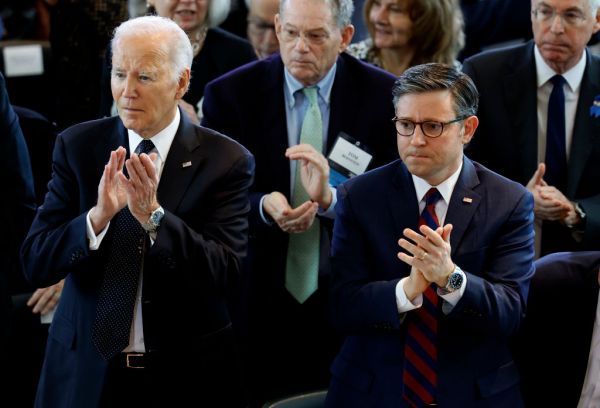Happy Friday! We’ve got some bittersweet personnel news to report, as today is Esther’s last day with TMD. As bummed as we are to be saying goodbye to a colleague and a friend, we’ll be rooting for her as she pursues her dream of joining the State Department as a foreign service officer.
Thanks for all your hard work, Esther—we’ll make sure your appreciation for Taylor Swift, the Federal Reserve, and the great state of Maine lives on.
Quick Hits: Today’s Top Stories
- President Joe Biden is meeting with Japanese Prime Minister Fumio Kishida and South Korean President Yoon Suk Yeol today at Camp David, the first time since 2015 a president has received world leaders at the Maryland retreat. The trilateral summit is indicative of the warming relations between Tokyo and Seoul, united against the shared threats of China and North Korea. The leaders are expected to announce increased intelligence-sharing about threats like North Korean missiles and establish a three-way crisis hotline, as well as regular joint military exercises.
- The Biden administration approved the transfer of training materials for F-16 fighter jets to Denmark so Ukrainian pilots can train on the American jets. The administration also gave assurances to Denmark and the Netherlands that the U.S. will “expedite” approval of the transfer of the jets themselves to Ukraine. However, Kyiv does not expect them to arrive in time to aid the current counteroffensive, which according to U.S. intelligence obtained by the Washington Post, will likely fail to meet its objective of reaching the southeastern city of Melitopol and severing Russia’s land bridge to Crimea.
- Israeli officials said Thursday that the U.S. granted approval for them to sell the Arrow 3 air-defense missile system to Germany in a $3.5 billion deal, the largest arms deal in Israeli history. Germany will make the purchase as part of the European Sky Shield—a multilateral effort to set up a ballistic missile defense shield in the wake of Russia’s invasion of Ukraine.
- President Biden announced Thursday that White House Counsel Stuart Delery will leave his post in the coming weeks after holding the job for a little more than a year. Delery was a key architect of the administration’s student loan forgiveness plan struck down by the Supreme Court, and has spent much of this year responding to congressional investigations. Biden has not yet named Delery’s replacement.
- Prosecutors charged a Texas woman with threatening to kill the judge overseeing special counsel Jack Smith’s case against former President Donald Trump regarding efforts to overturn the 2020 election. The woman called Judge Tanya Chutkan’s chambers and left a voicemail threatening to kill her if Trump isn’t reelected, according to the criminal complaint. The caller also threatened to kill Rep. Sheila Jackson Lee, all Democrats in D.C., and all people in the LGBTQ community. Meanwhile, the Fulton CountySheriff’s Office said Thursday it was investigating online threats made against some of the grand jurors who voted to indict former Trump and 18 co-defendants earlier this week in Georgia. The names of all of the grand jurors were released as part of the 98-page indictment, as is required by Georgia law—in most states and in the federal system, grand jurors remain anonymous.
- Wildfires in Canada’s Northwest Territories have prompted the evacuation of Yellowknife, the province’s capital, in recent days, with authorities ordering 20,000 residents to leave their homes by Friday. Most of Canada’s 1,000 wildfires are burning out of control, and smoke from the blazes has once again threatened to blanket regions stretching from the Midwest to New York with poor air quality this weekend.
- Sixty-three people are presumed dead after a migrant boat was discovered this week adrift off the coast of West Africa near Cape Verde. Authorities rescued 38 people from the vessel, but 56 people were missing since the boat began its voyage from Senegal more than a month ago, and seven bodies were recovered from the boat. Cape Verde lies along a migrant route to the Canary Islands—a Spanish-controlled territory seen as a pathway to migrating to Europe.
Shutdown Looming?

With Congress increasingly unable to see through even the most rudimentary of tasks without a ruckus (even electing a speaker is a tall task these days), we know it can feel like political doomsayers prophesy a government shutdown every year. But with only six weeks to go until the end of the current fiscal year—and Congress on August recess until after Labor Day—it’s becoming harder and harder each day to picture any other outcome.
When the House returns to Washington on September 5, members have a long few weeks ahead of them: Speaker Kevin McCarthy has vowed to pass all 12 individual spending bills through committee, a feat Congress hasn’t achieved on time since 1977. In the 45 years since, Congress has opted instead for omnibus spending packages, packaging together all the smaller bills for easier passage. To earn the support of some Republican holdouts earlier this year, however, McCarthy promised a return to regular order.
The transition has been a little choppy. The Senate has gotten all 12 of its bills through committee markups, but none of those has been taken up yet on the floor, while the House has gotten 10 of its bills through committee and thus far passed one, approving the military construction and VA bill last month along party lines.
McCarthy reportedly told his conference on a Monday evening call that he expects to pursue a short-term continuing resolution (CR) to buy Congress more time for budget negotiations without shutting down the government. According to readouts of the call, McCarthy favors a CR that would push the deadline to early December, hoping not to cut into the Christmas vacation. “I thought it was a good thing that he recognized we need a CR in September,” Senate Majority Leader Chuck Schumer told reporters Tuesday. “I’m supportive of that.”
Passing individual spending bills on their own, as McCarthy has opted to do, empowers his hardline Freedom Caucus colleagues to demand vast spending cuts in committee markups, heightening the likelihood of a shutdown. Freedom Caucus members have also signaled that they have no intentions of going along with a CR, at least unless McCarthy offers concessions to the group.
“Under no circumstances will I support a ‘continuing resolution’ to fund the government at the bloated, corrupt 2023 levels,” Rep. Chip Roy of Texas—the group’s policy chair—said in response to McCarthy’s proposal. Instead, Roy floated the idea of passing a series of 24-hour CRs, a process that would likely lead to considerable dysfunction in the House and give McCarthy flashbacks to his four days of whipping back in January.
Even once those internal issues are resolved, the House will have to get on the same page with the Senate, which could end up approving anywhere from $70 to $190 billion more than the lower chamber. Here’s some important context from Harvest in Tuesday’s edition of Uphill:
McCarthy has already meted out some wins to that flank of the party, but those concessions have left the House and Senate on different pages when it comes to topline numbers. After some House conservatives decried a deal McCarthy cut with Biden in May to raise the debt ceiling, the speaker agreed to write most appropriations bills at much lower, fiscal year 2022 numbers. The Senate, however, has largely ignored the House and opted to write its appropriations bills to the budget targets agreed to in the debt ceiling deal.
All of this is complicated by the Biden administration’s request last week for $40 billion in supplemental emergency funding earmarked for disaster relief, border security, and Ukrainian aid. The request is already rubbing GOP lawmakers the wrong way, with McCarthy saying the White House did not brief Republicans on it in advance, a claim the White House denies. Despite the request being exempt from the agreed-upon budget caps, a sizable minority of House Republicans have expressed skepticism about continuing to back the Ukrainian war effort.
“Americans are struggling under ‘Bidenomics,’ watching a border invasion bring crime & drugs to our communities, and witnessing a corrupt two-tiered justice system, and this President wants billions more $$$ for Ukraine,” Rep. Bob Good, another Freedom Caucus Member, tweeted last week.
The White House has not commented on whether Biden would agree to a short-term resolution, but deputy press secretary Olivia Dalton told reporters Tuesday the Biden administration expects to reach a deal with Republicans on funding the government. “We think that we can work together to meet the needs of our country and the urgent needs that we’ve put forward,” she said.
While the long-term effects of government shutdowns on the economy tend to be limited, the looming possibility of Congress missing its deadline to fund the government could play into the Federal Reserve’s thinking at a key time for monetary policy. The Fed raised interest rates last month after hitting pause on rate hikes in June, but officials are divided on whether to hold rates steady in September. Gennadiy Goldberg, a senior U.S. rate strategist at TD Securities, told Bloomberg a shutdown “could lead to the Fed potentially missing a Fall pivot point.”
Some in the GOP are confident that a shutdown will put the spotlight on Democrats’ runaway spending, but history has not been kind to lawmakers who’ve staked their careers on the gambit. Voters have disproportionately blamed Republican lawmakers for shutdowns or close calls in every major standoff with Democratic presidents since 1995, and public opinion polling conducted last month showed that two-thirds of Americans—across party lines—were against a shutdown even “if it meant making progress on an important issue or cause that I really believe in.”
“[Republicans] bungled it, and bungled it in very, very similar ways in 2011, 2013, and in 1995,” conservative columnist and former presidential speechwriter John Podhoretz opined on The Revolution With Steve Kornacki podcast. “They shut the government down, thinking that that was a good move and was going to be helpful to them, and that the country was behind them, and the country was never behind them, because one thing the government isn’t supposed to do is shut down. And the people who say, ‘We’re shutting it down,’ are blamed for shutting it down.”
The Superconductor That Wasn’t
Batteries that can store and move solar power across the world? Accessible quantum computing? Floating trains? A laptop that doesn’t bake your lap when you open too many browser tabs?
It may sound impossible, but it’s all theoretically within reach if we achieve high-temperature, ambient pressure superconductivity—eliminating the energy loss to resistance present in current conducting materials. A team of South Korean researchers claimed last month to have achieved just that, using relatively cheap materials and processes that suggested the results could have practical uses. But after other research teams failed to replicate the claims, physicists are still only dreaming of such superconductors.
The conductive materials we currently use to transmit energy have some resistance—think electrons tripping over atoms on their way down a copper wire to power your toaster. Energy lost in transmission is partially why ideas like an ocean of solar panels in the Sahara powering the world aren’t practical—we don’t currently have an efficient way to get that energy to your aforementioned toaster.
Superconductors, by contrast, offer no resistance whatsoever and are already used in tools like MRIs. But keeping electrons on the perfect glide path requires highly specialized conditions that scientists have so far managed to produce only at extremely cold temperatures—the 1987 discovery of a superconductor that functioned at a balmy minus 400 Fahrenheit was so exciting that it earned researchers a Nobel Prize and kicked off a jubilant results-sharing conference dubbed the “Woodstock of Physics.”
In that context, it’s easy to see why preprint papers posted in late July by scientists from the Quantum Energy Research Centre in South Korea were heralded as what Joe Biden might call a “BFD.” The researchers claimed a material dubbed LK-99—a modified version of a lead apatite—superconducted at and above room temperature and at ambient pressure. Along with some graphs of their measurements, the researchers provided a video of a partially floating rock—evidence, they said, of the Meissner effect. This sign of superconductivity occurs because the superconducting material expels all magnetic fields, leaving the superconductive sample hovering as if by magic above a magnet. Their sample lump was only mostly hovering, the scientists said, because of an impurity in the material.
Made of cheap substances and via a relatively simple process, LK-99 offered a tantalizing promise of practical superconductivity. “We believe that our new development will be a brand-new historical event that opens a new era for humankind,” the research team wrote. Previous superconductivity claims have attracted much less attention, but this one grabbed the spotlight in part because the theoretical ease of replication encouraged enthusiastic amateurs to livestream and tweet their attempts, just as lab and university teams across the world conducted experiments trying to reproduce the LK-99 results. The process was peer review gone viral.
Alas, it ended as science often does—pushing human knowledge forward by finding another way things don’t work. Thanks to gaps in the South Korean researchers’ explanation of how they’d synthesized LK-99, it took some trial and error for other researchers to replicate the process. But as scientists produced close replicas, they didn’t find evidence of superconductivity and did find alternative explanations for suggestive details like the floating sample.
At Peking University in Beijing, for example, researchers trying to synthesize LK-99 did get some “small flaky fragments” to float, but found they all contained “weak yet definitive soft ferromagnetic components.” Ferromagnetism would explain LK-99’s levitation without superconductivity. Indian researchers also produced a sample that closely matched the South Korean data, but found it was diamagnetic, becoming magnetized in the opposite direction of the applied magnetic field. This, too, could produce hovering without superconductivity—frogs are diamagnetic and can also hover with a strong enough magnetic field, but you won’t see anyone rushing to build amphibian-based electric grids. “There is no sign of superconductivity in LK-99 at room temperature,” the researchers’ pre-print concluded.
The South Korean superconductivity claim isn’t the only one on the market. In March, the University of Rochester’s Ranga Dias and collaborators said they’d found a material that could superconduct at temperatures up to 70 Fahrenheit—though under pressure of 145,000 pounds per square inch. But an earlier paper by Dias also claiming a superconductivity breakthrough has already been retracted, and he’s facing blowback for apparent fabrication and plagiarism in other research, causing many scientists to cast a skeptical eye on this most recent claim. The university has launched an investigation of possible research misconduct.
Although there’s currently no evidence the South Korean researchers deliberately misrepresented their findings, it looks like scientists will need to keep hunting for the holy grail. “With a great deal of sadness, we now believe that the game is over,” the University of Maryland’s Condensed Matter Theory Center concluded August 7. “LK-99 is NOT a superconductor, not even at room temperatures (or at very low temperatures). It is a very highly resistive poor quality material. Period. No point in fighting with the truth.”
Worth Your Time
- Ryan Burge, a pastor and political science professor in Illinois, argues in the Wall Street Journal that churches are increasingly suffering the consequences of the ‘big sort’—the trend of Americans self-segregating socially, economically, and even geographically. “Neighborhoods, schools and workplaces turned out to offer very little economic diversity,” he writes. “The one venue that did was houses of worship. But as American religion is increasingly dominated by educated, middle-class worshipers, the likelihood that a person facing financial struggles will show up for services is growing smaller by the year. Being economically and educationally stratified means that houses of worship are becoming more politically homogeneous as well. If someone walked into an average Protestant or Catholic church in the 1980s, they were just as likely to sit next to a Democrat as a Republican. That’s no longer the case: In almost all majority-white Protestant churches, political conservatives dramatically outnumber those who are left of center. In 1978, 50 percent of white weekly churchgoers were Democrats and 40 percent were Republicans. Today, 60 percent identify as Republicans and just 25 percent as Democrats.”
- Today is former first lady Rosalynn Carter’s 96th birthday. After former President Jimmy Carter was placed in hospice care earlier this year, the pair will celebrate together at their home in Plains, Georgia. “Jimmy Carter is often out of bed first, waiting in his recliner for his wife to emerge,” Mary Jordan writes for the Washington Post. “‘Rosalynn comes in the room and makes a beeline for this chair and bends over and kisses him,’ said Jill Stuckey, a close friend. They spend many hours sitting side by side. Jimmy Carter has now lived longer than any other U.S. president. The couple’s 77-year marriage is in the presidential record books, too. ‘Never count Jimmy Carter out,’ said Gerald Rafshoon, who was Carter’s White House spokesman. ‘When he sets a goal, he gets there.’ Rafshoon and others believe a key reason the Carters keep going is that neither wants to leave the other. It was Carter’s unwillingness to leave Rosalynn home alone that led to his February decision to opt out of any more ‘medical intervention,’ a close family member said. Jimmy Carter, who had survived melanoma that had spread to the brain as well as injuries from several falls, said he wouldn’t go to the hospital anymore.”
Presented Without Comment
FTC Chairwoman Lina Khan: “When you have somebody with a good idea and a viable business built around that good idea, but the market is not rewarding that good idea, it suggests that something is broken in the market and that there may be a competition problem.”
Also Presented Without Comment
New York Times: Defend Trump and ‘Hammer’ Ramaswamy: DeSantis Allies Reveal Debate Strategy
Also Also Presented Without Comment
Politico: Donald Trump Calls Off Press Conference Where He Said He Would Share Report on Georgia Election Fraud Claims
Toeing the Company Line
- Reminder: Dispatch members within driving distance of Milwaukee can register here for Tuesday’s pre-GOP debate happy hour with Steve, Drucker, and Audrey—two drink tickets on us. Space is limited, so be sure to sign up soon—and invite any friends who might be interested in becoming a member!
- Reminder: We’re hiring! Perhaps related to Esther’s news at the top, we’re looking to bring on an editor to work on the Morning Dispatch. If you think you’re the person for the job, click here!
- In the newsletters: In Boiling Frogs (members only) Nick argues that Donald Trump’s rivals have squandered their chance to make an electability argument against the former president.
- On the podcasts: Chris joins Sarah and Jonah on this week’s Dispatch Podcast to preview the upcoming GOP primary debate.
- On the site: Kevin completes the Dispatch trilogy on why small-dollar political donations are a problem, Price explains what systematic reviews of gender-transition treatment have found, and Gabriel Malor analyzes Fani Willis’ RICO charge against Trump & Co.
Let Us Know
Since shutting down the government has proved to be unpopular, how should fiscal conservatives approach their goal of reducing government spending?
Clarification, August 18, 2023: A headline in this newsletter originally misidentified the subject of the second item as a semiconductor, rather than a superconductor.










